From the President: Family Medicine reforms in Central Asia
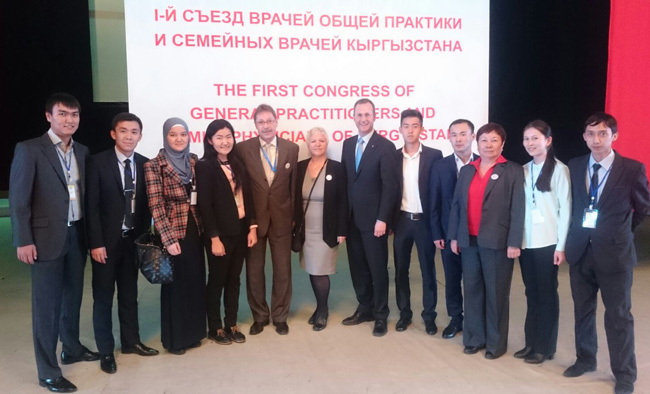 Photo: Michael Kidd, Amanda Howe and Job Metsemakers with family
medicine leaders and young doctors from Kyrgyzstan at the first ever
congress of general practitioners and family physicians of Kyrgyzstan
Photo: Michael Kidd, Amanda Howe and Job Metsemakers with family
medicine leaders and young doctors from Kyrgyzstan at the first ever
congress of general practitioners and family physicians of Kyrgyzstan
español
Dr Nazluhalum Gasanova is a family doctor working in the Family Medicine Centre in Marx Village in rural Kyrgyzstan. Originally trained as a paediatrician, Nazluhalum retrained as a family physician in the 1990s and now provides care to a community of 12,000 people, including 3,000 children aged under 14,. She works alongside one family doctor colleague and a team of six primary care nurses. Services are provided free of charge to all people enrolled with the clinic. She lives in the village and is called on day and night for emergency care. Last year Nazluhalum provided antenatal care to 234 pregnant women in her village. No wonder she is called “Doctor Mama” by the people of her village.
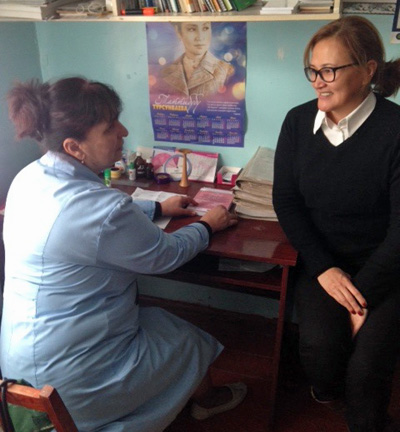 Photo: Family doctor, Nazluhalum Gasanova, in her clinic in rural Kyrgyzstan
Photo: Family doctor, Nazluhalum Gasanova, in her clinic in rural Kyrgyzstan
Kyrgyzstan, like many countries in Central Asia, is facing a new round of health system reform, based on family medicine and strengthening primary health care. There is recognition that the health system is over reliant on consultant specialists, with five subspecialists to each family doctor. Like many of the nations of the former Soviet Union, family medicine specialization was introduced in the 1990s and there were efforts to train other specialists to become family doctors, yet family doctors remain undervalued in the health system and the pay differential means few medical graduates are prepared to work as a family doctor in the cities, let alone in rural areas. Many of those trained as family doctors in the 1990s have migrated to neighbouring countries where conditions are better. Despite the challenges many medical students and recent graduates remain keen to become family doctors once the conditions are improved.
And improvement is underway. Not far from Nazluhalum’s village, the rural health centre in the village of Vasilyevka has recently been rebuilt, designed to meet the needs of delivering high quality primary care in a rural community, with an emergency ward, bright consulting rooms, pharmacy and point of care pathology testing. Husband and wife family doctor team, Dr Bazarkul Duishenaliev and Dr Sapura Mamatalieva, lead the small primary care team at the health centre. Yet both are beyond retirement age and nobody can be found to take their place. And so they continue to work knowing that if they stop, they leave the people of their region without access to medical care.
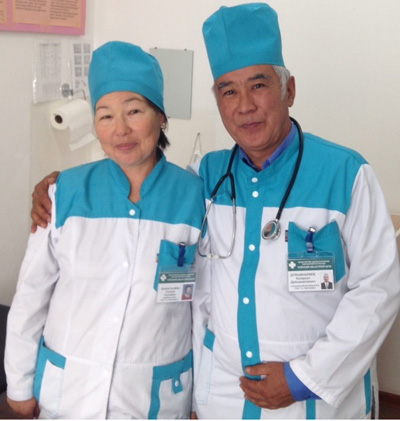
Photo: Husband and wife rural family doctor team, Dr Bazarkul Duishenaliev and Dr Sapura Mamatalieva
Bazarkul Duishenaliev is committed to population health. He is responsible for the medical care of the people of six small villages, and leads a team of community nurses and first access community health officers, called feldschers. To monitor the health of his population, Bazarkul has set up a map on the wall of his clinic with a small light for each house in each of the six villages of the region. He has programmed in the details of each house with a person with diabetes, with tuberculosis, with heart disease, with cancer, with asthma, and with a flick of a switch the board lights up to show the location of his patients with each chronic condition allowing him to coordinate the care provided by his team of community nurses and community health officers. He is a modern day John Snow.
Without gas and oil reserves, Kyrgyzstan is one of the poorest countries of Central Asia, yet it is also very beautiful with high mountains, lakes and grassy plains. A former member of the Soviet Union, most of the population lived a nomadic existence until only two or three generations ago. Now most people live in the main cities of Bishkek and Osh, or in smaller rural farming communities. Pride in the people’s nomadic heritage is strong and the roof opening of the traditional yurt (mobile home) features on the national flag.
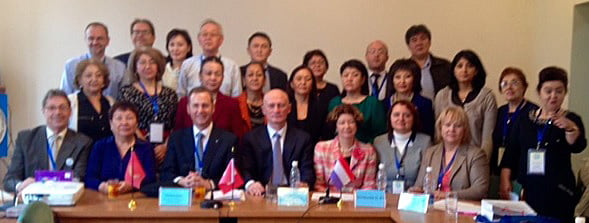
Photo: Roundtable participants from nations of Central Asia and the CIS meeting in Bishkek in Kyrgyzstan
I was in Kyrgyzstan, accompanied by WONCA president-elect Amanda Howe and WONCA Europe President Job Metsemakers, for the nation’s first congress of general practitioners and family physicians, hosted by the Minister of Health and the leadership of the Kyrgyz State Medical Academy. There is a strong partnership between Switzerland and Kyrgyzstan and a Swiss Government Foundation provided funding support for representatives of family doctor organisations from across Central Asian and CIS nations to attend the congress, and so we were joined by colleagues from many countries including Kazakhstan, Uzbekistan, Tajikistan, Mongolia, Russia, Ukraine, Lithuania and Belarus.
In a wonderful roundtable discussion, representatives of each nation of the region outlined the successes in primary care reform and the challenges faced by family doctors, and agreed to work together to advocate with governments for recognition of the specialty of family medicine, to support the development of postgraduate training in family medicine, to encourage medical students and recent graduates to train in family medicine, to promote research in primary care, and to ensure incentives are provided to encourage the best and brightest medical graduates to join us as family doctors.
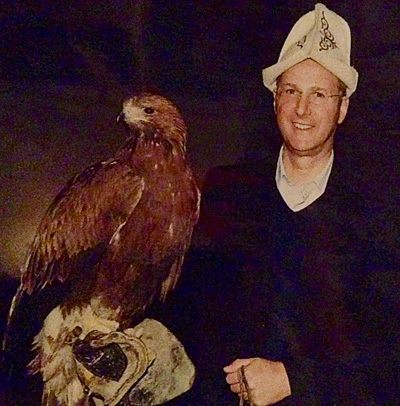
Photo: WONCA president adopts the guise of an eagle
handler. The beautiful bird is two years old and, in one year’s time,
when fully grown, will be used to hunt wolves
WONCA is keen to continue to support our colleagues across Central Asia to strengthen family medicine in each nation and to ensure that all people have access to high quality medical care in their communities delivered by well-trained and well-supported family doctors.
Professor Michael Kidd
President
World Organization of Family Doctors